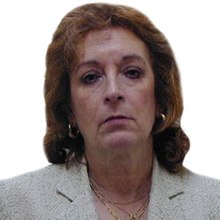Jorge Julio López is an Argentine retired bricklayer who was kidnapped during the National Reorganization Process, and disappeared again during the democratic government of Néstor Kirchner after testifying in trial against dictatorship criminal Miguel Etchecolatz.

Enriqueta Estela Barnes de Carlotto is an Argentine human rights activist and president of the association of Grandmothers of the Plaza de Mayo. One of her daughters, Laura Estela Carlotto, was kidnapped and missing while pregnant in Buenos Aires, in late 1977. Through stories, she could ascertain that her daughter had given birth to a boy, and that her grandson was appropriated and his identity changed. She searched for him for nearly 36 years, until, on 5 August 2014, after a DNA check voluntarily made by the person concerned, her grandson was identified, and became the 114th in the list of recovered grandchildren.

Ricardo Gil Lavedra is an Argentine lawyer, magistrate, and politician. A member of the Radical Civic Union, Gil Lavedra served as Minister of Justice during the early presidency of Fernando de la Rúa, from 1999 to 2000. From 2009 to 2013, he was a member of the Argentine Chamber of Deputies elected in Buenos Aires.

Romina Del Plá is an activist in the Workers' Party (Argentina).

Paula Mariana Oliveto Lago is an Argentine lawyer and politician. She is currently a member of the national Chamber of Deputies elected in the city of Buenos Aires for the 2021–2025 term. She is also president of Civic Coalition ARI (CC-ARI).

Eduardo Enrique "Wado" de Pedro is an Argentine lawyer and Justicialist Party politician who has served as National Senator since 2023. He previously served as the country's Minister of the Interior from 2019 to 2023, National Deputy for Buenos Aires Province, as member of the Council of Magistracy, and General Secretary to President Cristina Fernández de Kirchner.
The 2020 COVID-19 pandemic in Argentina affected the human rights situation in the country.
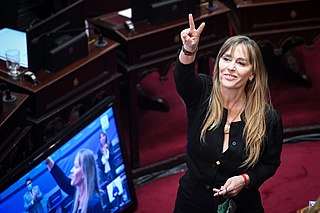
Juliana Di Tullio is an Argentine psychologist and politician. A member of the Justicialist Party, Di Tullio served three terms as National Deputy representing Buenos Aires Province, from 2005 to 2017. From 2013 to 2015, during the presidency of Cristina Fernández de Kirchner, Di Tullio was president of the Front for Victory parliamentary bloc in the lower chamber of the National Congress. She also served as a member of the Mercosur Parliament, and in the board of directors of the Banco Provincia. Since 2021, she has been a National Senator for Buenos Aires Province.

Mónica Leticia Schlotthauer is an Argentine railway worker and union leader who served as a member of the Argentine Chamber of Deputies elected in Buenos Aires Province on three occasions, from April to December 2019, from June to December 2021, and from June 2024 to date. Schlotthauer is a member of Socialist Left, a Trotskyist political party organized within the Workers' Left Front.
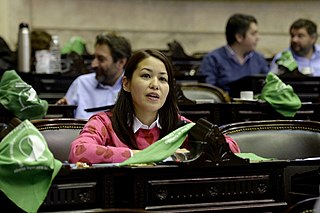
Laura Russo is an Argentine politician who served as a National Deputy from 2017 to 2021. A member of the Justicialist Party, Russo was elected in 2017 in Buenos Aires Province, and formed part of the Frente de Todos bloc from 2019 to 2021.
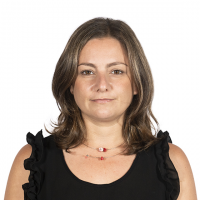
Vanesa Raquel Siley is an Argentine lawyer, trade unionist and politician, currently serving as National Deputy representing Buenos Aires Province. A member of the Justicialist Party, Siley was elected in 2017 for the Unidad Ciudadana coalition, and currently sits in the Frente de Todos bloc.
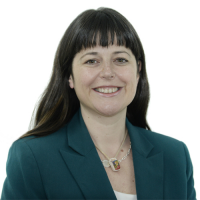
Ana Carolina Gaillard is an Argentine politician, currently serving as National Deputy elected in Entre Ríos Province. Having originally run in 2017, she took office on 19 December 2019, following the resignation Juan José Bahillo. She previously served as deputy from 2013 to 2017. A member of the Justicialist Party, Gaillard sits in the Frente de Todos bloc.

Daniela Marina Vilar is an Argentine politician and retired handball player, currently serving as Minister of the Environment of Buenos Aires Province, in the administration of Governor Axel Kicillof. A member of the Justicialist Party and La Cámpora, she previously served as a National Deputy elected in Buenos Aires Province in 2019 for the Frente de Todos. Before that, she was a member of the Lomas de Zamora City Council.
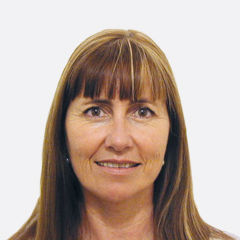
María Liliana Schwindt is an Argentine politician who served as a National Deputy elected in Buenos Aires Province on two occasions: she was first elected in 2013, and ran for re-election in 2017, as part of the 1País list, but was not elected. She assumed office in February 2020 in replacement of Felipe Solá. She is a member of the Renewal Front.

María Rosa Martínez is an Argentine trade unionist and politician, currently serving as member of the Buenos Aires Province Senate, elected in 2023. A member of Kolina, she was elected to the Chamber of Deputies in 2019 as part of the Frente de Todos. Martínez previously worked in a number of positions in the Ministry of Social Development during the administration of Alicia Kirchner (2007–2015), and as a city councillor in Almirante Brown. She is also active in the Corriente Federal de Trabajadores (CFT).

Estela Mercedes Regidor Belledone is an Argentine politician who served as a National Deputy elected in Corrientes Province. A member of the Radical Civic Union, Regidor was elected at the 2017 legislative election.

Roxana Nahir Claudia Reyes is an Argentine politician, currently serving as National Deputy elected in Santa Cruz since 2017. She is a member of the Radical Civic Union (UCR). Previously, from 2015 to 2017, she served as a member of the Chamber of Deputies of Santa Cruz, elected in the provincial list.

Dina Esther Rezinovsky is an Argentine politician. She served as a National Deputy elected in the Federal Capital from 2019 to 2023. She is a member of Republican Proposal (PRO).
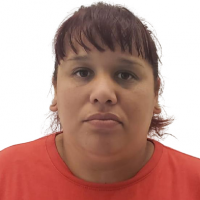
Natalia Beatriz Zaracho is an Argentine scrap collector, activist and politician, currently serving as a National Deputy of the Argentine Congress. She is a member of the Patria Grande Front.

Malena Galmarini is an Argentine political scientist and politician. She served as the president of Agua y Saneamientos Argentinos, a state-owned company dedicated to supplying the public with running water and sewer services, from 2019 to 2023. She previously served as a councilwoman in Tigre Partido from 2009 to 2019, and as Secretary of Health Policies and Human Development of Tigre from 2008 to 2017.
